- Home
- Tom Stoppard
Tom Stoppard Plays 2 Page 11
Tom Stoppard Plays 2 Read online
Page 11
DONNER: That’s it—help yourself to sugar.
MARTELLO: I’m not getting any. She’s set too hard.
DONNER: Knock off one of her nipples.
MARTELLO: I’d need a chisel.
DONNER: Wait a minute. I’ll tilt her over. Get the breast into your cup, and I’ll stir her around a bit.
MARTELLO: What a ridiculous business. How am I going to sprinkle her on my cornflakes?
DONNER: Starving peasants don’t have cornflakes. Good God, Martello, if they had any corn do you think they’d turn it into a sunshine breakfast for figure-conscious typists?
MARTELLO: What the hell are you talking about? What starving peasants? Honestly, Donner, you go from one extreme to the other. On the whole I preferred your ceramic sugar lumps.
DONNER: No, I got the whole thing back to front with my ceramic food. Of course, ceramic bread and steak and strawberries with plaster-of-paris cream defined the problem very neatly, but I was still avoiding the answer. The question remained: how can one justify a work of art to a man with an empty belly? The answer, like all great insights, was simple: make it edible.
MARTELLO: Brilliant.
DONNER: It came to me in my—incidentally, is it you who keeps using my face-cloth to clean the tub?
MARTELLO: No. It must be Beauchamp.
DONNER: That man has absolutely no respect for property.
MARTELLO: I know. And he’s taken to hiding the marmalade. Do you happen to know where it is?
DONNER: In the pickle jar.
MARTELLO: Cunning devil! Thank you.
DONNER: The olive oil is really honey.
MARTELLO: Incredible. It probably came to him in his bath, while he was using your flannel.
DONNER: Where is he?
MARTELLO: He went out to get some more sugar, out of his own money. I wonder where he’ll hide it.
DONNER: Let him. Sugar art is only the beginning.
MARTELLO: It will give cubism a new lease of life.
DONNER: Think of Le Penseur sculpted in …
MARTELLO: Cold rice pudding.
DONNER: Salt. Think of poor villages getting a month’s supply of salt in the form of classical sculpture!
MARTELLO: And not just classical!—your own pieces, reproduced indelibly yet edibly——
DONNER: Think of pizza pies raised to the level of Van Gogh sunflowers!—think of a whole new range of pigments, from salt to liquorice!
MARTELLO: Your signed loaves of bread reproduced in sculpted dough, baked … your ceramic steaks carved from meat! It will give opinion back to the intellectuals and put taste where it belongs. From now on the artist’s palate——
DONNER: Are you laughing at me, Martello?
MARTELLO: Certainly not, Donner. Let them eat art.
DONNER: Imagine my next exhibition, thrown open to the hungry … You know, Martello, for the first time I feel free of that small sense of shame which every artist lives with. I think, in a way, edible art is what we’ve all been looking for.
MARTELLO: Who?
DONNER: All of us!—Breton!—Ernst!—Marcel—Max—you—me—Remember how Pablo used to shout that the war had mad art irrelevant?—well——
MARTELLO: Which Pablo?
DONNER: What do you mean, which Pablo?—Pablo!
MARTELLO: What, that one-armed waiter at the Café Suisse?
DONNER: Yes—the Café Russe—the proprietor, lost a leg at Verdun——
MARTELLO: God, he was slow, that Pablo. But it’s amazing how you remember all the people who gave you credit …
DONNER: He gave you credit because you had been at Verdun.
MARTELLO: That’s true.
DONNER: It was a lie.
MARTELLO: Wasn’t I? It must have been pretty close to Verdun, our route was right through that bit of country, remember it well.
DONNER: God yes, what a walk. You were crazy, Martello.
MARTELLO: I must have been, I suppose.
DONNER: Beauchamp was crazy too.
MARTELLO: Him and his horse.
DONNER: That was about the last really good time we had …
MARTELLO: You hated it.
DONNER: No.
MARTELLO: More than the war.
DONNER: That’s what killed it for me. After that, being an artist made no sense. I should have stopped then. Art made no sense.
MARTELLO: Except for nonsense art. Pablo never understood the difference. He used to get so angry about his missing arm——
DONNER: (leg …)
MARTELLO: I can see him now—a tray in each hand, swearing … wait a minute——
DONNER: Leg.
MARTELLO: A tray in each leg—Are you deliberately trying to confuse me?
DONNER: He was right. He understood exactly. There wasn’t any difference. We tried to make a distinction between the art that celebrated reason and history and logic and all assumptions, and our own dislocated anti-art of lost faith—but it was all the same insult to a one-legged soldier and the one-legged, one-armed, one-eyed regiment of the maimed. And here we are still at it, looking for another twist. Finally the only thing I can say in defence of my figure is that you can eat it.
MARTELLO: And of mine that you can smile at it. How do you like her?
DONNER: It looks like a scarecrow trying to be a tailor’s dummy. Is it symbolic?
MARTELLO: Metaphorical.
DONNER: Why has she got straw on her head?
MARTELLO: Not straw—ripe corn. It’s her hair. It was either ripe corn or spun gold, and I wouldn’t know how to do that, it was bad enough getting the pearls for her teeth.
DONNER: They look like false teeth.
MARTELLO: Well of course they’re artificial pearls. So are the rubies, of course. I know you’ll appreciate her breasts.
DONNER: Oh yes. Are they edible?
MARTELLO: Well, you’re not supposed to eat them—I’m only using real fruit for the moment, and real feathers for her swan-like neck. I don’t know how to do her eyes: stars seem somehow inappropriate … Would you have described them as dark pools, perhaps?
DONNER: Who?
MARTELLO: Well, Sophie of course.
DONNER: Are you telling me that that thing is supposed to be Sophie?
MARTELLO: Metaphorically.
DONNER: You cad, Martello!
MARTELLO: I beg your pardon?
DONNER: You unspeakable rotter! Is nothing sacred to you?
MARTELLO: Hold on, Donner, no offence intended.
DONNER: What right have you to sneer at her memory?—I won’t allow it, damn you! My God, she had a sad enough life without having her beauty mocked in death by your contemptible artistic presumptions——
(Thump! A pearl bounces …)
MARTELLO: Now steady on, Donner, you’ve knocked out one of her teeth.
DONNER (by now nearly weeping): Oh Sophie … I cannot think of beauty without remembering your innocent grace, your hair like …
MARTELLO: Ripe corn——
DONNER: Gold. Your tragic gaze—eyes like——
MARTELLO: Stars——
DONNER: Bottomless pools, and when you laughed——
MARTELLO: Teeth like pearls——
DONNER: It was like a silver bell whose sound parted your pale ruby lips——
MARTELLO: A silver bell!—yes!—behind her breasts——
DONNER: —were like——
MARTELLO: —ripe pears——
DONNER: Firm young apples——
MARTELLO: Pears—For heaven’s sake control yourself, Donner, those are real artificial pearls——
(Pearls bouncing—DONNER thumping, gasping …)
DONNER: Oh Sophie … I try to shut out the memory but it needs only … a ribbon … a flower … a phrase of music … a river flowing beneath ancient bridges … the scent of summertime …
(Cliché Paris music, accordion …)
Flashback
(Keep music in. Fade.)
SOPHIE: I must say I won
’t be entirely sorry to leave Lambeth—the river smells like a dead cat, and the accordionist downstairs is driving me insane …
(SOPHIE is 22 and not at all bitter. Background is sound of leather suitcase being snapped shut and strapped up by YOUNG BEAUCHAMP who is in his mid-20s.)
If only someone would give him a job, elsewhere, even for a few minutes. Or perhaps we could employ him to take down our suitcases. He’d have to put his accordion down for that. But then he’d probably whistle through his teeth. I’m sorry to be so useless, darling … Are the others downstairs? … Yes … that’s them: isn’t it awful to know voices, instantly and certainly, by their shouts to the waggoner five floors down … I wish that yours was the only voice I knew that well. I like them well enough—they are both kind, and your oldest friends, which is enough to endear them … But I think now—forgive me—but I think now—before it is too late … I think we ought not to go with them, I think we ought to remain, just you and I … Darling—please—Please don’t do up the strap—say what you think—it’s not too late—Please say quickly, I heard Banjo’s feet across the hall, he’ll be up in a moment …
(The strap-noise, surreptitious now, starts again.)
Please don’t do it up! … not even slowly …
(Wan, affectionate, ironic.) I can hear the clothes you put on in the morning … Your serge today, hear it and smell it—with a cornflower out of the vase: I caught that the minute you put it in your buttonhole—do you sometimes wonder whether I’m a witch …? I’m only your good fairy, if you let me, and I want to stay here with you. I’ll be all right, after all this time, I’m confident now, I won’t be frightened, ever, even when you leave me here—and of course you will be going out—often—to visit Mouse and Banjo in their new studio—Please say.
BEAUCHAMP: Sophie … How can I say …?
(Door. YOUNG MARTELLO.)
MARTELLO: Hello … So—what news?
BEAUCHAMP: None.
(Violently pulls strap tight.)
I’ll take this down. How’s the waggon?
MARTELLO: All right, but I fear for the horse—bow-backed and spindle-shanked.
BEAUCHAMP: I’ll … come back.
(Door.)
SOPHIE: I’m sorry not to be helping. I have to sit by the window and be look-out.
MARTELLO: (laughs openly): Oh, that’s frightfully good. Always making such good fun of yourself, Sophie …
(Accordion.)
SOPHIE: Perhaps there will be another accordionist waiting for us across the river. And no doubt the smell will be much the same on the left bank. But I shall like the Chelsea side much better.
MARTELLO: It’s a better class of people, of course. Even the artists are desperately middle-class.
SOPHIE: I was thinking of the sunshine—we’ll be facing south on that bank, and we’ll get the sun through our front windows. I shall sit at my new post, with the sun on my face, and imagine the view as Turner painted it. It probably has not changed so very much, apart from the colours. Don’t you wish you could paint like Turner?—no, I’m sorry, of course you don’t, how stupid of me … Well, I don’t suppose Turner would have wished to paint like you. He could have done, of course.
MARTELLO: Of course.
SOPHIE: But he would not have wished to.
MARTELLO: It would not have occurred to him to do so; I think that’s really the point.
SOPHIE: Yes, I think it really is. What are you doing now?
MARTELLO: I’m not painting now. I’m making a figure.
SOPHIE: I really meant now—at this moment—what are you doing here?
MARTELLO: Oh. Well, I’m not actually doing anything now, just talking to you.
SOPHIE: Can you see a hamper anywhere?
MARTELLO: A hamper?—no.
SOPHIE: There ought to be one; for my shoes and handbags.
MARTELLO: Well, wait till Biscuit comes up—I think I can hear him on the stairs.
SOPHIE: No, that’s Mouse. What silly schoolboy names. When will you stop using them?
MARTELLO: I suppose they are silly when you hear them—but we never hear them because they are merely our names … I expect we shall stop using them when we are very old and painting like Landseer.
SOPHIE: Not without lessons. I didn’t mean to sound scornful, about your names. I’m nervous about moving.
MARTELLO: Yes. Of course.
SOPHIE: Nicknames are really very touching. Did you ever play the banjo?
MARTELLO: No. I was thought to be similarly shaped when young. Biscuit kept saying, ‘Well, that takes the biscuit.’
SOPHIE: Yes, I know. And ‘Mouse’ because he enters quietly.
DONNER: Hello, Sophie.
(Pause.)
SOPHIE: What is going on? (Pause.) He told me about your figure.
MARTELLO: Did he?
SOPHIE: Only that you were doing one. What is it?
MARTELLO: Well, actually it’s called ‘The Cripple’. It’s going to be a wooden man with a real leg.
SOPHIE: A sort of joke.
MARTELLO: Yes.
SOPHIE: And will you actually use a real leg?
MARTELLO: Well, no, of course not. I shall have to make it.
SOPHIE: What will you make it of?
MARTELLO: Well, wood … of course.
(Pause.)
SOPHIE: How about a black-patch-man with a real eye——
MARTELLO: Sophie——
SOPHIE (breaks—bursts out): He doesn’t know what to do with me, does he?—Well, what’s going to happen?—you’re all going, aren’t you?
MARTELLO (quietly): Mouse is going to stay. Excuse me …
(Leaves, closes door.)
(Pause.)
SOPHIE (recovered): You’re staying?
DONNER: Yes.
SOPHIE: Why?
DONNER: Either way it’s what I want to do.
SOPHIE: Either way?
DONNER: If you’re going with them, I don’t want to live so close to you any more.
SOPHIE: If I’m going …?
DONNER: Sophie, you know I love you … how long I’ve loved you …
SOPHIE: He wants me to stay? With you?
DONNER (cries out): Why do you want to go? (quietly) He’s stopped caring for you. He only hurts you now, and I can’t bear it. When he made you happy I couldn’t bear it, and now that he hurts you I … just can’t bear it——
SOPHIE: Does he love someone else?
DONNER: He hasn’t got anyone else.
SOPHIE: That isn’t what I asked. Does he love that poet?—that educated Bohemian with the private income?—He read me her poems, and then he stopped reading me her poems. I thought he must be seeing her.
DONNER: Only in company. I’m sure she doesn’t think twice about him——
SOPHIE: Is she going with him——?
DONNER: No—of course not! … It’s not even a suitable place to share like that—it’s just one large attic room, the beds all together and just cooking gear in the corner——
SOPHIE: He never intended that I should go.
DONNER: It really is most unsuitable. The bathroom is on the landing below, with steep unprotected stairs—you could fall—Sophie, you must stay here, you know it here—and I’ll abide by any terms——
SOPHIE: When was he going to tell me?
DONNER: Every day.
SOPHIE: Perhaps he was going to leave a note on the mantelpiece. As a sort of joke.
DONNER: Sophie … I love you. I’ll look after you.
SOPHIE: Yes, I know you would. But I can’t love you back, Mouse. I’m sorry, but I can’t. I have lost the capability of falling in love. The last image that I have of love is him larking about in that gallery where you had your first exhibition. ‘Frontiers in Art’—what a lark you were, you three, with your paintings of barbed wire fences and signboards saying ‘You are now entering Patagonia’—you were such cards, weren’t you? all of you merry, not at all like artists but like three strapping schoolboy cric
keters growing your first pale moustaches. I liked you all very much. I liked the way you roared with laughter at all your friends. I never heard anything any of you said, and you didn’t take any notice of me at the back in my stiff frock and ribbons and my awful thick glasses, but I liked you all anyway, and bit by bit I couldn’t stop looking at him, and thinking, which one is he?—Martello? Beauchamp? Donner? … It was quick: one moment the sick apprehension of something irrevocable which I had not chosen, and then he was the secret in the deep centre of my life. I wouldn’t have called it love myself, but it seems to be the word that people use for it.
DONNER: And when you next saw us——
SOPHIE: —I couldn’t see you. But at least I no longer had to wear those glasses, and I knew I looked quite pretty …
DONNER: You were beautiful.
Flashback
(MARTELLO and SOPHIE are climbing stairs. Above them, behind closed doors, the sound of a ping-pong game in progress.)
MARTELLO: Quite a climb, I’m afraid … Five more steps up now, and then turn left and that will be the top floor …
SOPHIE: It must be a lovely big room …
MARTELLO: We each have our own room, actually, but we share the drawing room—Left—jolly good show.
SOPHIE: I hear that ping-pong is quite the fad.
MARTELLO: Is it really?—please allow me …
(Door. Ping-pong loud. The rally ends with a winning shot—denoted by the hiatus where one has been led to expect, from the rhythm, contact with the ‘other’ bat.)
SOPHIE: Good shot!
MARTELLO: Gentlemen, I have the honour to present to you Miss Farthingale.
(The ping-pong resumes.)
SOPHIE (disappointed): Oh.
MARTELLO: My friends, as you know, are called Mr. Donner and Mr. Beauchamp. Mr. Beauchamp is to your right, Mr. Donner to your left.
(The ball hits the net: familiar sound of small diminishing bounces on the table.)
SOPHIE: Bad luck.
MARTELLO: They are not in fact playing ping-pong.
SOPHIE: Oh!
MARTELLO: That is why they are momentarily taken aback.
Turn it off, Beauchamp.
(Cut ping-pong.)
SOPHIE: I’m sorry.
DONNER (hurriedly): How do you do?
BEAUCHAMP: How do you do?
MARTELLO: There’s no point in sticking out your hands like that. Miss Farthingale is blind.

 The Dog It Was That Died and Other Plays
The Dog It Was That Died and Other Plays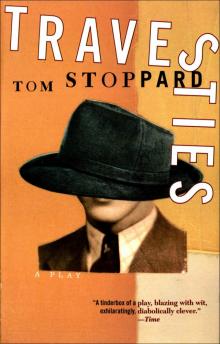 Travesties
Travesties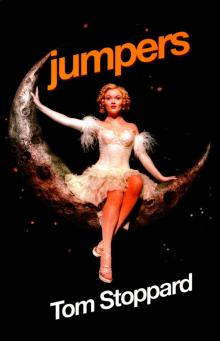 Jumpers
Jumpers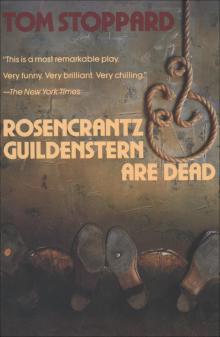 Rosencrantz and Guildenstern Are Dead
Rosencrantz and Guildenstern Are Dead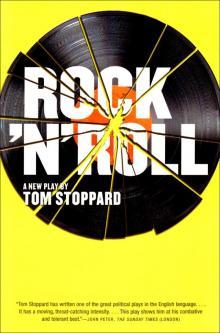 Rock 'N' Roll
Rock 'N' Roll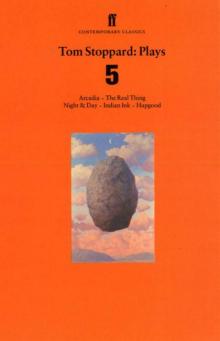 Plays 5
Plays 5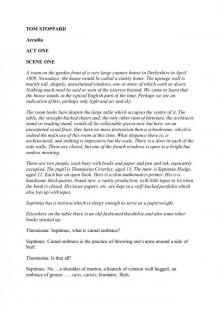 Arcadia
Arcadia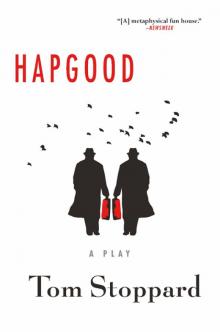 Hapgood
Hapgood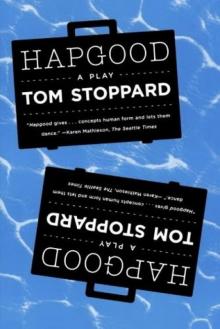 Hapgood: A Play
Hapgood: A Play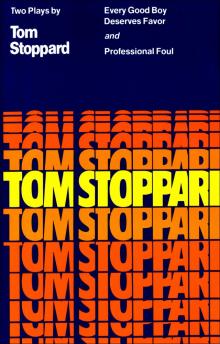 Every Good Boy Deserves Favor & Professional Foul
Every Good Boy Deserves Favor & Professional Foul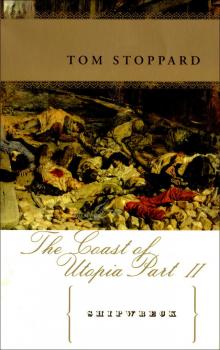 The Coast of Utopia: Voyage, Shipwreck, Salvage
The Coast of Utopia: Voyage, Shipwreck, Salvage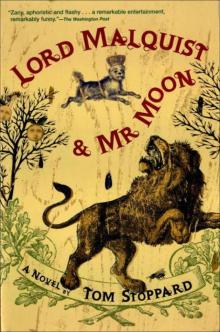 Lord Malquist & Mr. Moon
Lord Malquist & Mr. Moon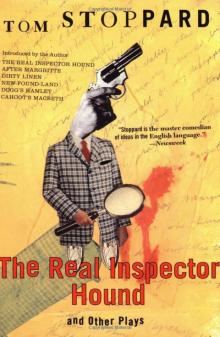 The Real Inspector Hound and Other Plays
The Real Inspector Hound and Other Plays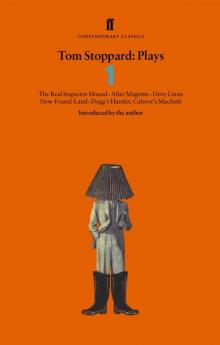 Tom Stoppard Plays 1
Tom Stoppard Plays 1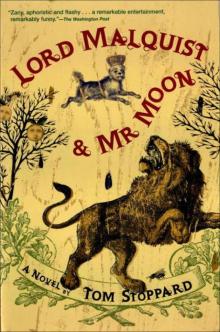 Lord Malquist & Mr. Moon: A Novel
Lord Malquist & Mr. Moon: A Novel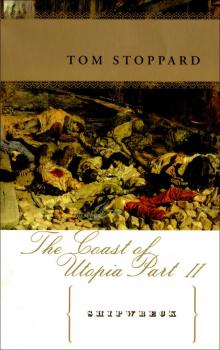 Shipwreck
Shipwreck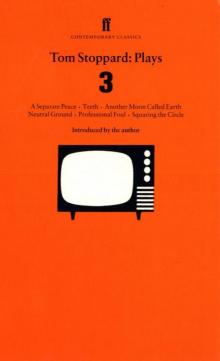 Tom Stoppard Plays 3
Tom Stoppard Plays 3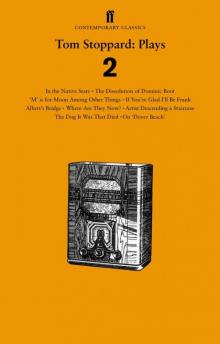 Tom Stoppard Plays 2
Tom Stoppard Plays 2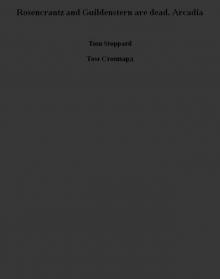 Rosencrantz and Guildenstern are dead. Arcadia
Rosencrantz and Guildenstern are dead. Arcadia